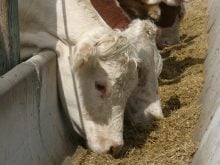The federal Conservative government has introduced proposals for sweeping changes to the Canadian Grain Commission that would eliminate mandatory inward inspection and weighing and ensure the commission focus is helping the industry and not just producers.
The proposed changes, if enacted into law, could eliminate as many as 200 jobs, 30 percent of the existing staff for the Winnipeg-based commission.
Parliamentary debate on the legislation, bill C-39, will not start until after the House of Commons returns from its Christmas break Jan. 28.
An election before Parliament approves the legislation would kill it.
Read Also

Alberta farm lives up to corn capital reputation
Farm to Table Tour highlighting to consumers where their food comes from features Molnar Farms which grows a large variety of market fruits and vegetables including corn, with Taber being known as the Corn Capital of Canada.
Some grain trade representatives praised the proposals as a way to reduce system costs and increase efficiency.
“I think this is a good bill, moving in the right direction,” said Western Grain Elevators’ Association executive director Wade Sobkowich. “It will get rid of some unnecessary costs and bureaucracy and still give producers protection.”
The National Farmers Union condemned the proposals as a weakening of farmer protection in the interests of pacifying agribusiness.
NFU president Stewart Wells said agriculture minister Gerry Ritz is trying to turn the clock back to the days before farmers had protection from more powerful industry players.
For his part, Ritz said he was responding to suggestions for change contained in a 2006 report by the consulting company Compas Inc. and subsequent recommendations from the Commons agriculture committee.
He said the proposed changes would “benefit farmers by improving the regulatory environment for Canada’s grain sector.”
The minister said he will introduce a second piece of legislation to deal with recommendations on reform of the governance structure of the grain commission. The Compas report recommended creating a more corporate management structure to replace the existing system of three commissioners based in Winnipeg and assistant commissioners located throughout the country.
“There will be a separate piece of legislation coming in the future to address governance,” Ritz told a Dec. 14 news conference. “Some of those changes can be made in a regulatory way. I’ll have those discussions with the new commissioners and of course with the affected industry in the near short term.”
Among the major changes proposed in the bill tabled in Parliament Dec. 13, hours before the House rose for the holiday, were:
- An end to mandatory weighing and inspection of grain moving from country elevators to terminal or transfer elevators. Shippers will continue to have the right to request weighing and inspection.
Sobkowich said it will eliminate unnecessary costs and bureaucracy in cases where an elevator company is sending grain from a country facility to its own terminal. The NFU said it will weaken monitoring of the system and expose producers to more risk.
Eliminating inward inspection will be one of the one of the key reasons jobs will be lost.
“We estimate it will be in the 200 position range,” commissioner Cam Dahl said. “We will be working with the union and the employees to see how this can best be done.”
Staff meetings are being held in Vancouver, Prince Rupert, Winnipeg, Thunder Bay and Montreal to discuss the possible changes.
- A clarification of the grain commission’s mandate to reiterate that while it is to protect farmer interests when making deliveries, receiving grade and dockage decisions and receiving producer cars, the commission also has a responsibility to service the entire industry.
A background explanatory document said the new wording ensures that “while the CGC performs and should continue to perform certain specific functions directly in the interests of producers, the CGC performs most functions in a balanced and unbiased manner to serve the entire grain sector.”
- An end to the requirement that elevators and dealers must post a security bond before they can be licensed.
- An end to the power that a grain commission inspector has to stop grain being loaded into a car or vessel if it is deemed not clean or sound enough.
- Elimination of the grain appeal tribunal system and ending the declaration that a decision by the chief commissioner or a designated representative on any appeal over grain grades will be final and not subject to court appeal.














